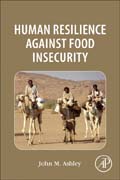
Human Resilience against Food Insecurity focuses on the human factors involved in building resilience against food and nutrition insecurity in perpetuity through better managing risks (such as 'better-spacing' of children), diversifying the asset portfolio, behavioral change, and communication strategies for to help achieve these goals. The better the coherence and convergence amongst these human factors that promote sustainable food and nutrition security, the lower the need to rectify their absence through post-facto,unsustainable 'firemen's work' of humanitarian assistance and CMAM clinics. The book includes references to countries which are not in the lowest of the categories prescribed in the UNDP Human Development reports, also including minority groups in developed countries, such as the hunter-gatherer Inuit communities of Canada, to provide an inclusive view of the issues and concerns relevant to addressing food insecurity. Includes a global array of case studiesPresents stories of success and failure in building resilience against food insecurity with the causative human aspect underlying each Addresses the social and cultural anthropological foundation of combatting food and nutrition insecurity INDICE: 1. Introduction 2. A Summary of 'Food Security in the Developing World' 3. Understanding Vulnerability To, And Resilience Against, Food Insecurity 4. The Anthropological Basis of Human Development 5. The Starting Point of a Development Intervention 6. Identifying and Prioritizing the Challenges Confronting Food Security Resilience for All 7. Building the Change Management Team and Approach 8. Importance of Local Knowledge in Building Resilience 9. Lateral Thinking 10. The Role of Champions 11. Case Studies 12. Conclusions
- ISBN: 978-0-12-811052-2
- Editorial: Academic Press
- Encuadernacion: Rústica
- Páginas: 224
- Fecha Publicación: 01/06/2018
- Nº Volúmenes: 1
- Idioma: Inglés
